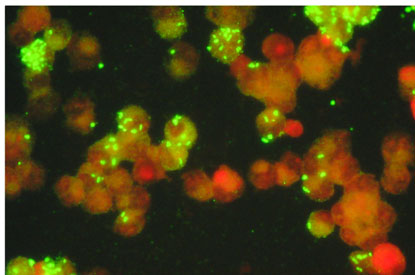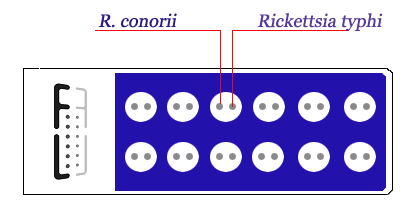Rickettsia
Rickettsia are zoonotic obligate intracellular bacteria of the family Rickettsiaceae. They are associated with arthropods, primarily ticks, but also including fleas, body lice and mites, which serve as the main reservoirs. These arthropods serve as vectors of rickettsiosis while feeding on both humans and animals.
The antibody response to infections by these agents is primarily directed against group-common (spotted fever or typhus groups) lipopolysaccharide (LPS) and 2 outer-membrane attachment proteins (OmpA and OmpB). The standard IFA and MIF methods detect antibody against the whole organism and remain the most commonly used diagnostic methods, not necessarily the best. IgM-specific antibody assays are particularly prone to false-positive reactivity with whole cell antigens due to the LPS antigen.
Typhus group (TG) Rickettsia
The antibody response to infections by these agents is primarily directed against group-common (typhus group) lipopolysaccharide (LPS) and 1 outer-membrane protein (OmpB). The standard IFA and MIF methods detect antibody against the whole organism and remain the most commonly used diagnostic methods, not necessarily the best.
For Rickettsia typhi and R. prowazekii the IgG ELISA utilizes both OmpB and TG LPS, while the IgM assay utilizes purified native OmpB (LPS-free). A 2-antigen MIF assay (FBT-12 slides) is available for R. typhi and R. felis in flea-borne typhus testing. For additional information see Flea-borne Typhus Poster.
Spotted fever group (SFG) Rickettsia
For SFG species our ELISA IgG assay (SFG-96K) utilizes purified LPS, the major acute-phase reactant, to specifically detect reactivity to all SFG species equally. The LPS antigen is group specific, but parsing individual species requires a panel of multiple purified LPS-free protein antigens, each of which is surprisingly specific in the IgG assay, but such a panel is not for routine diagnostic use.
For SFG IgM the opposite is true, although the protein antigens must be totally LPS-free. The reactivity of IgM antibody is group-common to the β-peptide associated with the OmpB protein of both SFG and TG species. This recombinant antigen is LPS-free, avoiding the high level of non-specific responses (false-positive) due to the use of whole cell antigens (IFA and MIF tests). Please note information detailed in our 2018 ASR Poster presentation.
For more information on specific Rickettsia species and associated products click here.
Rickettsia IFA substrate slides are available for all or most of the officially validated species, 16 of which are currently recognized as human pathogens. Due to the Class 3 nature of these organisms, our traditional substrate antigens have been formalin-inactivated prior to slide preparation.These slides contain Vero-76 cells with 30-40 infected cells per field when using a 40X lens.
Our new larger BSL3 facilities are allowing us the opportunity to prepare slides with infected substrate cells grown in situ within the slide wells. This line is being retooled to use acetone-fixation as the inactivation step and will be currently available for a a growing number of species. The effect is subtle, but worth the effort as an IgG screening protocol.
Due to the presence of an immunodominant lipopolysaccharide (LPS) antigen on native spotted fever Rickettsia, the occurrance of false-positives due to this antigen compromises the value of both IFA and MIF protocols for IgM testing. We strongly recommend ELISA protocols using our purified protein (OmpA and OmpB) antigens for IgM testing. The LPS antigen has been removed to provide an assay free of false-positive reactions.

| ITEM NUMBER | ITEM DESRIPTION | KIT INSERT |
| RRG-120 | R. rickettsii IgG IFA Kit | RRG-120-English RRG-120-Czech RRG-120-German RRG-120-Italian |
| RRM-120 | see R20M-120 protocol | |
| RCG-120 | R. conorii IgG IFA Kit | RCG-120-English RCG-120-Czech RCG-120-German RCG-120-Italian |
| RCM-120 | see R21M-120 protocol | |
| RTG-120 | R. typhi IgG IFA Kit | RTG-120-English RTG-120-Czech RTG-120-German RTG-120-Italian |
| RTM-120 | see R20M-120 or R21M-120 protocols | |
| RR-12 | Rickettsia rickettsii 12-well IFA Slides | ASR |
| RC-12 | Rickettsia conorii 12-well IFA Slide | ASR |
Rickettsia MIF substrate slides are available for all or most of the officially validated species, 16 of which are currently recognized as human pathogens. These slides feature purified Rickettsia elementary bodies within a contrasting background matrix, with up to 6 antigens per slide well.
Several of the 2-3 antigen formats are stocked for general screening purposes (see image below). Other multi-antigen substrate slides are prepared on a custom basis with combinations of Rickettsia with other particulate antigens (Anaplasma, Ehrlichia, Coxiella, Bartonella, etc). This affords the opportunity for testing facilities to configure screening slides with broader or more specific utility.
Note: Due to the presence of an immunodominant lipopolysaccharide (LPS) antigen on native spotted fever and typhus group Rickettsia, the occurrance of false-positives due to this antigen compromises the value of both IFA and MIF protocols for IgM testing. We strongly recommend ELISA protocols using our Omp antigens (LPS-free) for IgM testing.

| ITEM NUMBER | ITEM DESRIPTION | KIT INSERT |
| R20G-120 | R. rickettsii / R. typhi IgG MIF Kit | R20G-120-English R20G-120-Czech |
| R20M-120 | R. rickettsii / R. typhi IgM MIF Kit | R20M-120-English R20M-120-Czech |
| R20-12 | R. rickettsii / R. typhi MIF Slides | ASR |
| R21G-120 | R. conorii / R. typhi IgG MIF Kit | R21G-120-English R21G-120-Czech R21G-120-German R21G-120-Italian |
| R21M-120 | R. conorii / R. typhi IgM MIF Kit | R21M-120-English R21M-120-Czech R21M-120-German R21M-120-Italian |
| R21-12 | R. conorii / R. typhi MIF Slides | ASR |
| R24G-120 | R. conorii / R. africae IgG MIF Kit | R24G-120-English |
| R24M-120 | R. conorii / R. africae IgM MIF Kit | R24M-120-English |
| R24-12 | R. conorii / R. africae MIF Slides | ASR |
| FBTG-120 | Flea-borne typhus IgG MIF Kit | FBTG-120-English |
| FBTM-120 | Flea-borne typhus IgM MIF Kit | FBTM-120-English |
| FBT-12 | R. typhi / R. felis MIF Slides | ASR |
Rickettsia ELISA modules are 12 x 8-well strip modules optimally coated with either lipopolysaccharide (LPS) antigens or outer-membrane (OmpA and OmpB) protein antigens. They are packaged in resealable pouches with 2 x 2 gram molecular seive desiccant packets. The LPS antigen is recommended for IgG testing, as this antigen is most often immunodominant and has broad reactivity for spotted fever organisms (SFG-96). The OmpA + OmpB antigen mix is more species-specific and is recommended for IgM testing, where they are the immunodominant antigens. Modules for IgG and IgM use are prepared with different antigens and coating concentrations and must be ordered separately.
Rickettsia IgM antibody can be accurately determined with our ELISA assay or by western blot assay, where the OmpA and/or OmpB antigens are the only useful markers. IFA and MIF assays may sound useful and are still the predominant clincal assays, but false-positives have been reported for many years. We looked at this annoying problem versus our ELISA assay for a poster presented at the 2018 American Society for Rickettsiology meeting in Milwaukee.
| ITEM NUMBER | ITEM DESRIPTION | KIT INSERT |
| RRM-96 | Spotted Fever IgM ELISA module | RRM-96K-English RRM-96K-Spanish |
| SFG-96K | Spotted fever group IgG ELISA Kit | SFG-96K-English SFG-96K-Czech SFG-96K-Italian |
| RTG-96K | R. typhi IgG ELISA Kit | RTG-96K-English RTG-96K-Czech RTG-96K-German RTG-96K-Italian RTG-96K-Spanish |
| RTM-96K | R. typhi IgM ELISA Kit | RTM-96K-English RTM-96K-Czech RTM-96K-German RTM-96K-Spanish |
| RFG-96 | R. felis IgG ELISA kit | RFG-96K-English RFG-96K-Spanish |
Rickettsia monoclonals have been produced against both protein and LPS (lipopolysaccharide) antigens of several species over the years. Some of the more popular ones have been made available for researchers in the field and are in stock, ready for shipping. Other clones require a few weeks of preparation.
Since those induced by immunization with outer-membrane proteins are rarely species-specific, the patterns of reactivity follow the relationships seen in the dendrogram of relationships. For example, Rickettsia conorii conorii may also react with R. conorii caspia and R. rickettsii, but not R. conorii indica. Graded reactivity to a range of different species is available for all clones (see individual datasheets). Please note that these reactivites were noted on formalin-inactivated whole cells by MIF testing.
In contrast, those clones induced by immunization with LPS show classic reactivity across the group. Monoclonal anti SFG LPS detects all spotted fever Rickettsia, while anti typhus group LPS reacts with both R. typhi and R. prowazekii. These reagents are especially useful for immuno-histochemistry (IHC) staining where the particular species may or may not be known, but a multi-purpose mouse monoclonal can detect it cleanly.

IFA-MIF-MSDS Download
